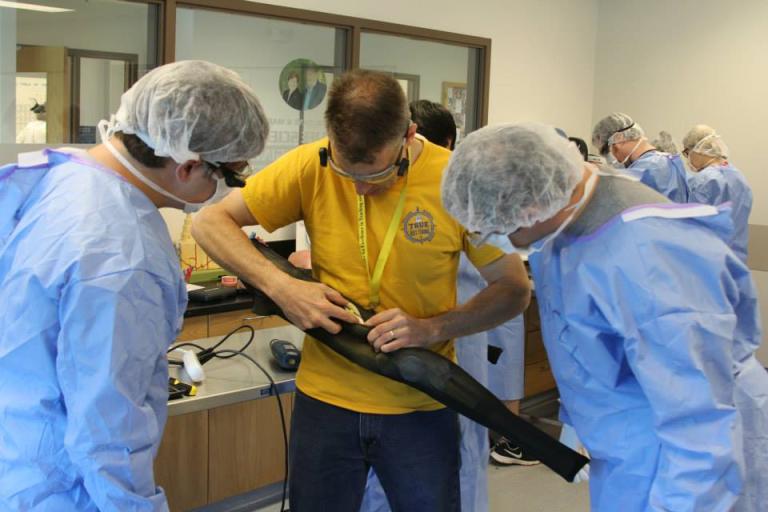
“The course is perfect for Mechanical Engineering and Biochemistry students with an interest in healthcare and pre-med students.”
Experiential education is the focal point of all elements of Kettering University’s model. But thanks to a topical grant from the Kern Entrepreneurial Engineering Network (KEEN), Dr. Patrick Atkinson, professor of Mechanical Engineering, has been able to transform his Introduction Bioengineering Applications (MECH-350) course into what he calls “intensively experiential.”
The course is the first for students pursuing a concentration in Bioengineering, and along with being extremely hands-on, it is also multi-disciplinary, incorporating physics, chemistry, mathematics, biology, engineering and business/marketing principles, among others, into lessons.
“The course is perfect for Mechanical Engineering and Biochemistry students with an interest in healthcare and pre-med students,” Atkinson said. “It is important to understand the technology of healthcare, and you also can’t be a one-trick-pony. You need to understand chemistry, anatomy and a wide range of disciplines. Students in the course learn to go where the problem takes them.”
The course is a mix of short lectures along with hands-on activities and projects. For example, in one project, students constructed replicas of a human leg, including bones, tendons, muscle and skin. They then had to ‘break’ the leg and perform surgery on it to put it back together.
“The process of building it helps them learn where everything is and how it is all connected,” Atkinson said. “In order to create solutions, medical professionals have to understand the biology of the body -- it’s not just repairing a car.”
Atkinson also noted that the design of the course, which alternates between interactive lectures and hands-on activities, is intended to appeal to all learning styles.
“The course is designed for all learners. It is intensively experiential,” he said.
The Bioengineering concentration has been around at Kettering since 1996. The KEEN topical grant allowed Atkinson to revamp the class and make it more interactive and entrepreneurial. Students in the course work to identify gaps in today’s healthcare system, with input from local physicians. They not only learn about science and engineering concepts related to healthcare, but they also have to gain an understanding of how to build a successful business model, be compliant with federal regulations, successfully market their ideas through producing commercials that convey value, among other tasks.
Many of the students who pursue the concentration are passionate about creating healthcare solutions based on personal experiences.
“The course appeals to people who have been through a healthcare crisis, and came out of that experience with a desire and passion to help others,” said Atkinson, who completed his undergraduate degree at Kettering in 1991. “When I was a student, I would’ve loved a course like this. It would’ve fit me like a glove because my intention was always to find ways to use my education to help society.”
KEEN Topical Grants are designed to build a collection of entrepreneurially-minded engineering education resources geared toward undergraduate engineering students. Grants support a variety of initiatives, including development, delivery and refinement of instructional materials as well as development of new educational models, co- and extracurricular programs and fostering connections with academic and industry partners.
Atkinson’s course is one of five at Kettering to receive a KEEN Topical Grant since 2013.